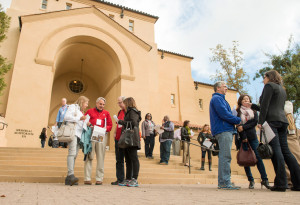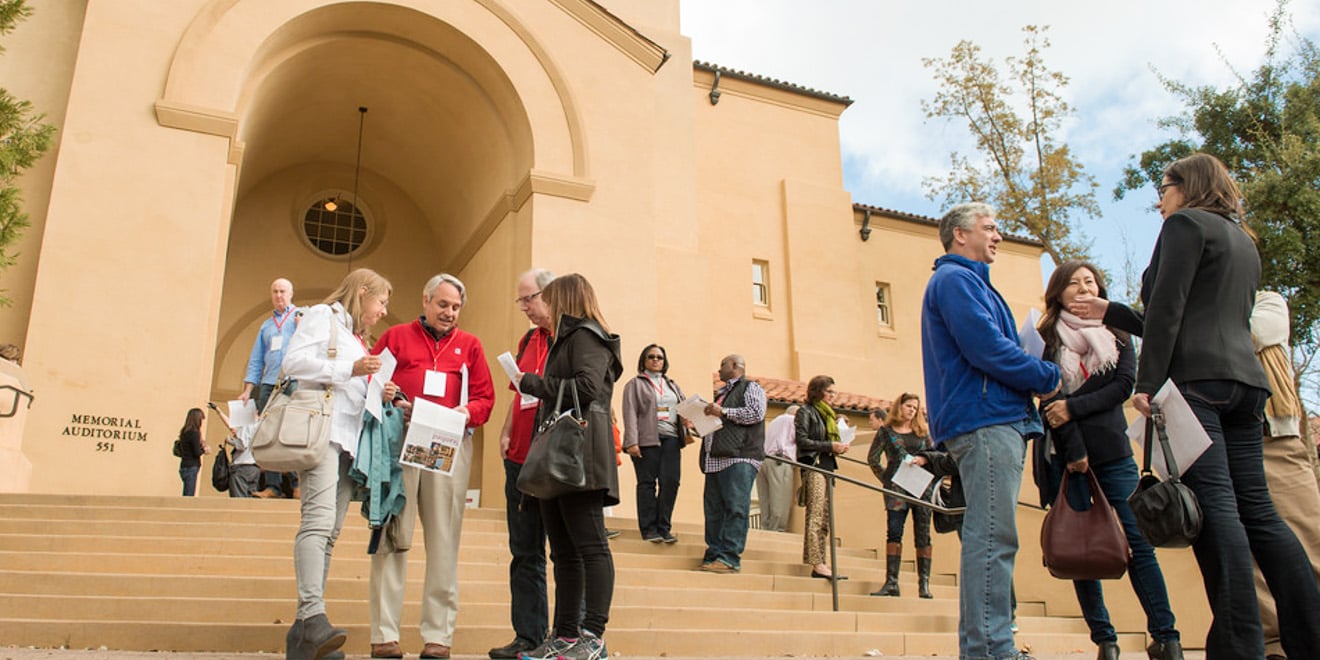Alex Paramo ‘18 would have liked for his family to join him on campus this Parents’ Weekend, but unfortunately, that was out of the question. The flight from his home state of Illinois plus the cost of overnight accommodations was prohibitively expensive.
Paramo is one of many students whose parents face financial barriers to making the trip to Stanford for Parents’ Weekend. Unlike the travel grants given to some prospective students to attend Admit Weekend, Stanford does not offer aid to students’ families to travel to the event.
Paramo said he is used to the idea of his parents not being able to make it to things — in his childhood, they worked during the day and were unable to attend most events — and it’s not a big deal that they can’t come this time.
“I kind of already knew that it’s impossible for them to fly out here,” he said.
Some feel the exclusion more acutely, though.

(Courtesy of Linda A. Cicero).
“I hate Parents’ Weekend,” reads one recent anonymous post on Class Confessions, a Facebook page created by the First-Generation Low-Income Partnership (FLIP) that highlights issues of socioeconomic class identity at Stanford.
The post continues: “Every year I’m reminded that my parents don’t have the kind of jobs or the kind of money to fly here for a weekend. Every year Stanford emails my dad with the invitation and every year I hate that he feels like he needs to apologize to me for not being able to come.”
Jennifer Telschow ’14, alumni advisor for the Diversity and First-Gen (DGEN) Office, says that for her first four years at Stanford, her mother couldn’t make it to the event and felt guilty about it.
“That weekend falls on her birthday, so I would always mention that it was Parents’ Weekend, and she would always feel really bad that she couldn’t come…and she always felt like she was missing out on something,” Telschow said.
Her mother was able to make it once, but only by rearranging her work schedule so travel for her job took her to California and the trip was paid by her employer.
Shanika Pelpola ’15, co-president of FLIP, says that those sentiments were echoed at a discussion group FLIP held last Friday on the topic of Parents’ Weekend.
According to Pelpola, attendees at the discussion expressed a general sentiment that the way the University celebrates Parents’ Weekend, there seems to be an expectation that everybody should be able to participate.
“The fact that a lot of parents couldn’t come because of the financial burden, that automatically excludes a bunch of students,” Pelpola said.
Airfare and hotel rooms aren’t the only problem, she added: Parents’ Weekend festivities begin on a Friday, but not everyone can afford to take a day off work.
Marcus Alvarez ’16 has never been able to bring his family to Parents’ Weekend due to the expense. Like Paramo, he doesn’t mind too much: the event is not the most important thing to him. But he knows it’s been a big issue for some of his peers, and says that Parents’ Weekend can feel “very exclusionary.”
“I personally feel that Stanford does have the funds, and that they should pay for the small number of students who are really having difficulty getting their parents here. I feel like that should not be a problem at all,” Alvarez said.
The University has explored options to provide assistance in the past, but currently has no aid program, said University spokesperson Lisa Lapin in an email.
“There are numerous obstacles, including tax implications and other regulations, to providing aid to non-students for non-academic purposes,” wrote Lapin.
A financial aid program would be the ideal solution to the problem, says Pelpola, but in lieu of that — or in addition to it — the event should be restructured in a way that makes it possible for students of all backgrounds to participate.
Even when family members can make it to campus, cultural barriers may arise. For one thing, the title of the event itself is in a way exclusionary, said Telschow: It implies a traditional “two-parent” family structure.
Telschow worried that her single mother would not feel welcome when she came to Parents’ Weekend.
“I, as a student and as a daughter, was concerned about how affirmed she would feel in those spaces,” said Telschow.
FLIP recently sent out to several email lists a list of suggestions for making the event more inclusive, as well as an op-ed advocating for these changes.
Suggestions include renaming the event “Parents and Families Weekend” and avoiding well-intentioned but sometimes alienating questions like “Where did you go to college?” or “What do you do for a living?”
To help support students whose families can’t come to campus, FLIP holds several Parents’ Weekend events. One of their most popular this year was a “Crafts-n-Chill” session, where students were invited to hang out, eat snacks, and make cards to send to families back home. Another was a luncheon for both FLIP families who could come to campus as well as students whose families were unable to come.
“We want to continue to make those spaces available and expand them in the future,” said Pelpola.
Contact Abigail Schott-Rosenfeld at aschott ‘at’ stanford.edu.
In a previous version of this article, Jennifer Telschow’s quotes were incorrectly attributed to another student. The Daily regrets this error.
